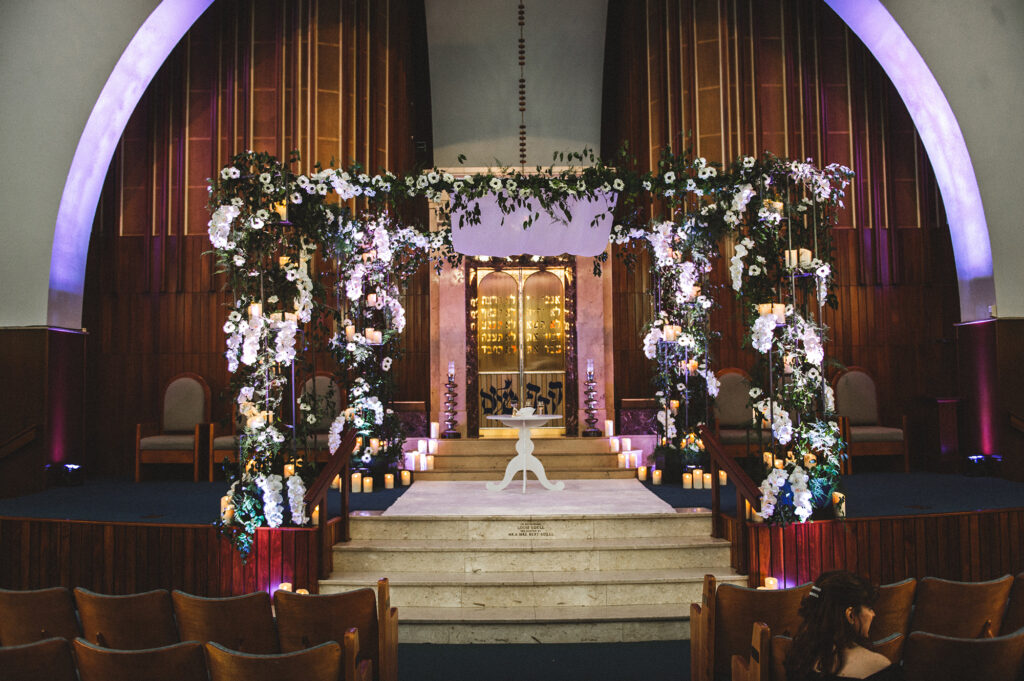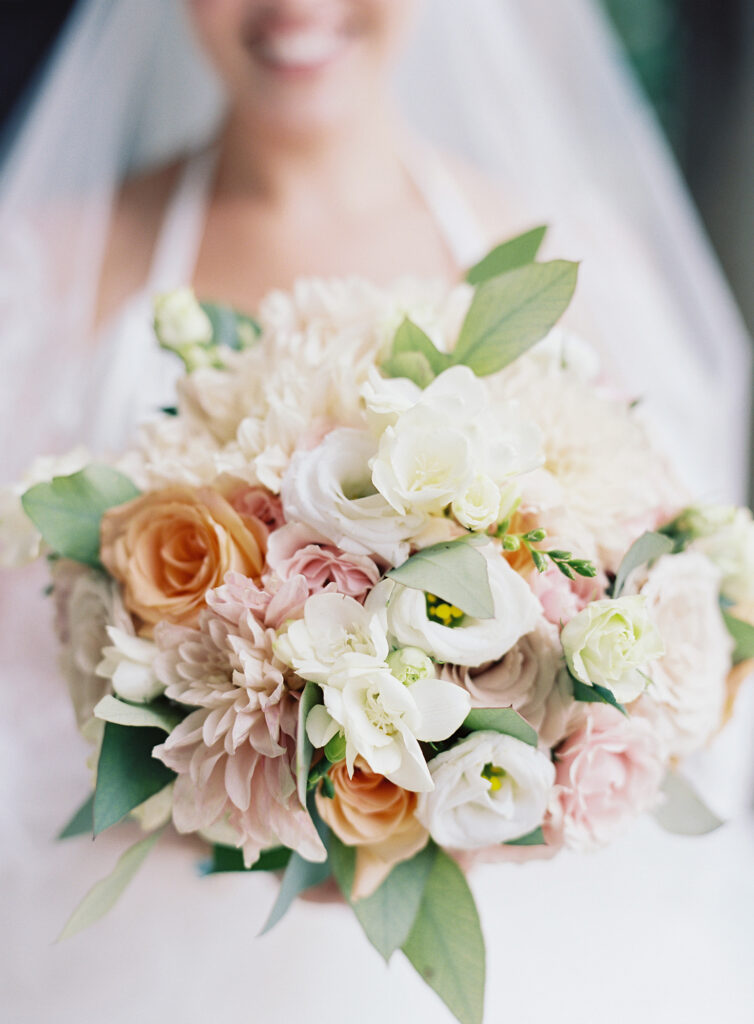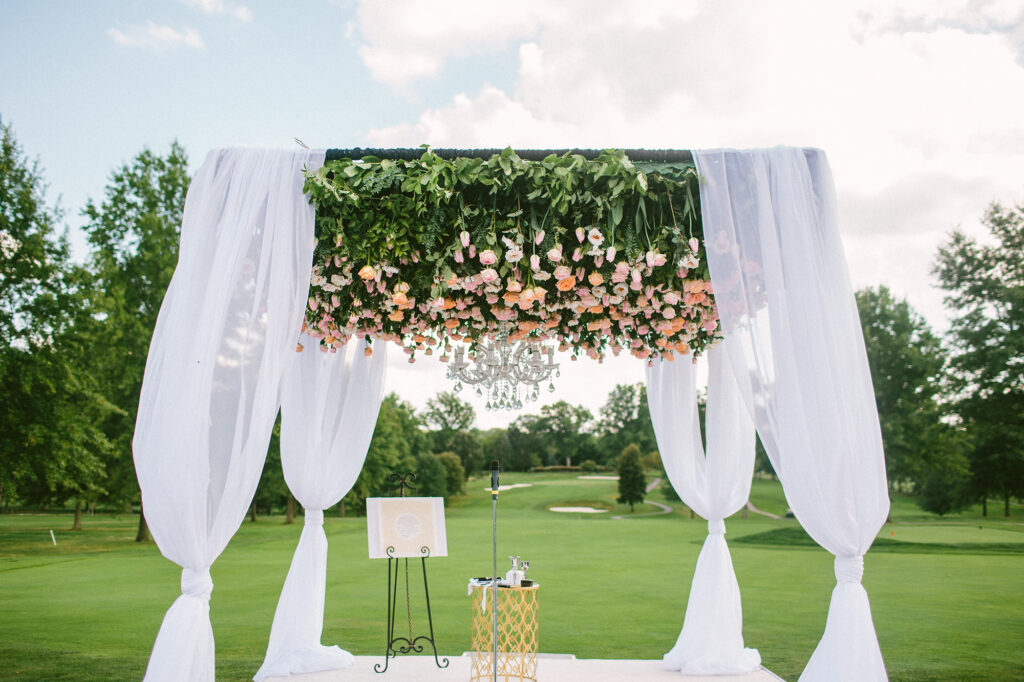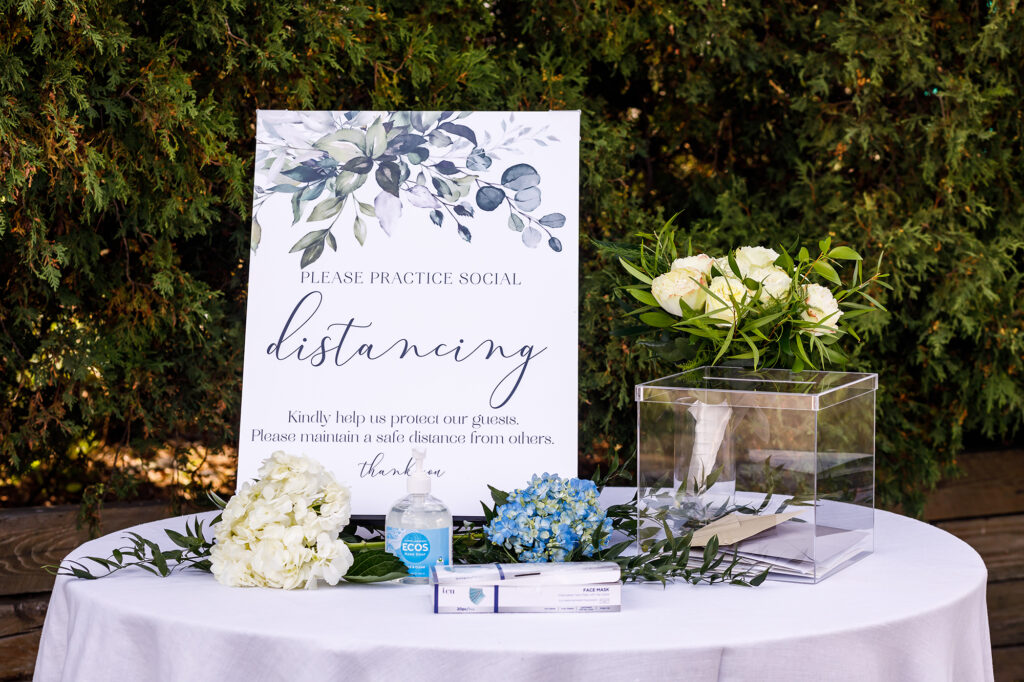Story by Amanda Koehn
While the event planning industry back in March and April scrambled with cancellations due to the pandemic, now it’s back to work.
Over the last several months, those professionals’ jobs have come to revolve around helping clients develop a new plan – or in some cases, several new plans – incorporate virtual aspects and enact safety and health precautions at smaller celebrations.
Kim Singerman, founder and event director at Noteworthy Events in Solon and Cincinnati, says work is “steady,” yet most of the celebrations she’s planned recently – mostly weddings – have had 20 people or fewer. Still though, she says it feels good to be back at it.
For Alison Quinn Cox, event consultant at Joe Mineo Creative in Youngstown, which plans events in Northeast and Central Ohio and Pittsburgh, there’s also been a rise in “last minute weddings.”
“Maybe their venue cannot have the event anymore, and so now they’re looking to do their events in their backyard or on a friend’s property,” leading to planning a mostly new event, Cox says.
Singerman and Cox discussed with Celebrations event planning during this strange new time, explaining how they’ve shifted and why intimate, smaller simchas may be here to stay. Their responses were edited for brevity and condensed.

How has your work shifted over the course of the pandemic?
SINGERMAN: First, (it was) actually like shifting dates. I originally helped (couples) plan their wedding, and then all of a sudden we were postponing and re-planning on a new date.
I have one client, where I (did) their little wedding on Oct. 3 in their house. That’s a third wedding (plan) for them. Their (first) wedding was June 27, we moved it to Nov. 21, Now, that wedding is not going to happen, so we rescheduled it to Oct. 3. But then we’re also having a big celebration without the ceremony next year. So that’s actually my fourth event for this family for the same wedding.
It’s a little hectic. Needless to say I’m disappointed for my clients. There was a day back in, I want to say April, where I had six weddings postpone in two days. That’s a lot of juggling and redoing all the contracts. It’s finding a date, and finding the date that works for all of the vendors – which most of the time it did because we acted very quickly.
COX: It’s been such a roller coaster of what’s going to happen next, and ensuring that our clients can still have a really great event, but it’s not going to be the one they imagined before.

What kind of questions are you getting from clients now?
SINGERMAN: They want to know what other people are doing, so I tell them about my other clients, without using their names. And I feel like they feel better because they know that they’re not in this alone.
The main thing I do is just work hard to assure them that whatever we are going to do is done in a way they are comfortable with. And most importantly, however many guests they have, the guests that do decide to attend are comfortable and they feel like we’ve made efforts to keep people safe or protected. The state says you could have 300 guests at a wedding. That doesn’t mean it’s the right thing to do. It doesn’t mean that your guests are going to feel comfortable. I know there are some people that are still doing it. I personally advised all of my clients – and that’s like 20 weddings – to postpone their weddings.
COX: The biggest concern is, should I postpone? They’re also asking how to have the celebration that they were used to before 2020. We’re telling them they need to make that decision based off of a few things. Is the date they had set for 2020 important? Then we will do everything in our power to make sure they have a wonderful event using social distancing guidelines.
Even though during these six months we’ve seen some policies lifted, we’re still not seeing the pre-COVID days of events. For example, you are limited (in) dancing, you need to have things individually wrapped, you need the catering staff to serve the food instead of grabbing it on your own. We want to prepare you for what might happen if you have an event in 2020. And then, let’s pretend if you do postpone to 2021, we want you to be familiar with things that we are doing now. So, in case COVID continues into 2021, you are aware that things are going to be a little bit different.
Say someone wants to have a big wedding. Do you have a date in mind you tell them to postpone until?
COX: We do not unfortunately. We ask that they – as well as we – keep an eye on the government policies and the state’s policies. Unfortunately on Jan. 1, 2021, COVID isn’t going to disappear. I certainly hope that it gets better, and we just want to make sure they are aware of a plan A and a plan B. That’s the best thing you could do right now is prepare for the best in normal times, and prepare for the worst in the times of social distancing.
SINGERMAN: I advise them to wait and see until at least spring 2021.
I have a client whose (initial) wedding was May 17 (2020). We postponed it. They wanted to get to 2021, and they decided to do it on Martin Luther King Jr. Day weekend. They already decided not to have 150, but to have between 30 and 40 people. It’s a big reduction.
We’re working with videographers to create private livestream URLs that (guests) can click on, that we send to only people who were already invited to the wedding. And then you give them the day and the time, just like a regular wedding, and they’re there watching – they’re just not there in person.

Do you have a safe number in terms a guest list for right now?
SINGERMAN: The largest wedding I’m personally doing right now is 50, and that is outside. There will not be chairs close to each other, and it is in a field. We’re calling it a pop-up wedding.
If it were bad weather, they weren’t going to do it. And even outside I’m still going to have a sanitizing station. I just actually purchased masks and sanitizer, and I had a “please practice social distancing” sign made that will be out.
I know there are weddings that use these colored wristbands. Green is, ‘I’ll talk to you,’ and then the yellow is more like, ‘I’d like to talk to you, but keep your distance,’ and no hugs. And then red is, ‘I’m here to see the wedding, but really don’t want to be in conversation or in close proximity with other guests.’ It’s a good idea.
I talked them into doing take-home boxes with box favors, which will include a small bottle of either champagne or apple cider (for guests), and a cupcake sealed in a container. That’s in lieu of a reception. I just think that’s a little appreciation for their guests.
COX: We are seeing a downscale in guest count, and that is based off of the venue policies. Tables now need to be further apart. And so that is then creating what’s called a tier system. We’re encouraging that if they are sending a save-the-date, they have a plan for those guests that you would need to cut. So, sending a save the date for May 8, you want to say ‘We hope to have it May 8.’ Because if you’re sending it to 200 guests, you need to drop it to 150. Have a plan and make sure your guests know they might be cut, and it’s only because of the circumstances that they would ever be cut – not out of negativity.
If you are concerned about guest count, find a larger venue that you wouldn’t normally (choose) – the more space there is to separate cocktails from dinner, dinner from dancing.
Are most of the weddings you’re planning ceremony only?
SINGERMAN: Most of the other mini-weddings I’m doing (have) a reception for the family. It’s a ceremony and then they’re having dinners and music, like a string quartet or other music for the ceremony, and then they play for dinner. What I think is, people are doing it up even more so because it’s such a small group – they can serve the best champagne or the best meal. So it’s easy to do that for 16 people, but you think twice before doing it for 300. So I feel like these little mini-weddings are pretty extravagant.
So, it’s like they can go all out on the things that they are doing?
SINGERMAN: Exactly. And a lot of times we’re using the same vendors, and some of them will negotiate – like using half of the time in 2020, and then the other part of the contract in 2021. So that way, (couples) didn’t have to, let’s say, pay for a photographer (or) videographer twice. I was able to create a timetable where we only used them where we really needed them this year, and then whatever remaining hours would go to the contract next year.
COX: Those have become very popular and are (considered) micro-weddings – where you are having a small ceremony with a possible reception, and then you’re doing a larger party at the future date. Those have been very popular because you could do it in two ways: you can do a micro-wedding and call it quits, or you can do a small ceremony and then allow additional guests to Zoom or to watch online, or do a Facebook Live – something to keep your guests knowing that you still want to celebrate with them.

What are some ways to get clients excited about smaller events?
COX: We always encourage clients and tell them all events are special no matter what size and what you’re doing – whether it is a small sit-down dinner for 12 people, or a large reception. The day is still about you. We’re going to do what we can with those small details to make it as special as possible. For example, if you have a smaller guest count, you might have the budget to personalize menu settings or special five-course meals for each guest, or an individual wedding cake for each guest. You have an opportunity to personalize the experience for your guests and yourself.
SINGERMAN: People are seeing that now on social media, so I do think that’s helping. Just because there are fewer people doesn’t mean it has to be simple. (For example), I arranged for car services for all the guests a couple weeks ago because they didn’t want their guests having some champagne and then driving. That’s a luxury.
And they’re still wearing their dresses. I always tell them they’re lucky because most people get to wear it once – they get to wear it twice if they want. We’re still doing up the decor with beautiful linens and beautiful floral and bouquets.
And we’re just really trying to make it more about them. My wedding a couple of weeks ago, my bride told me it was the perfect day. It was better because it was their closest family, and it was just like the most special evening where her two grandpas were there, and she actually got to sit and talk to them. Where when you have 250 or 300, every conversation is maybe a minute or two. This was an evening of meaningful speeches and her papas getting to see her. So, I think it’s more intimate and definitely as meaningful.

What are some ways that you talk to your clients about politely enforcing social distancing, masking and cleanliness?
COX: You always want to be as transparent as possible in your invitation. If wearing a mask is important to you, as well as the venue’s policy, please make sure you are putting that on your invitation. That way, every guest has a mask on and they know the policies are going to be enforced throughout the evening. You could also get personalized hand sanitizer with the bride and groom’s name on it. You could even create bathroom amenities that include customized soap, sanitizers, additional masks – things that are going to encourage the guests to take social distancing and sanitizing seriously. You could also create fun signage throughout the reception, you can create a hashtag. There are ways to social distance, but take it to the next level of having it being personal as well as fit to your wedding, so it doesn’t seem so corporate.
Say you are invited to a wedding and you don’t feel comfortable going. Is there an appropriate way to handle situations like that?
SINGERMAN: I think today it’s totally acceptable to tell someone you’re not comfortable because I think most important is everyone’s opinions and beliefs need to be respected, regardless of if you agree with it or not. You can’t be upset by someone who’s not comfortable coming to your big wedding. So the relationship with the person needs to be more important than whatever your belief is about them coming or not coming.
Weddings are stressful enough, and then you add COVID on top of it. And I think that people need to be comfortable – the people giving the wedding, but also the people attending the wedding. Many of my couples or families say to me, ‘Whatever people do, it’s OK.’ And I think that’s the right way to be.
Do you think any of these changes will stick after the COVID-19 era?
SINGERMAN: I definitely think the number of intimate weddings will increase. I am finding people are loving that experience. Now there are other people who want the 250-person wedding, and they’ll wait as long as it takes to have that wedding because that’s what’s important. Which is OK. But I feel that people in the future are going to look at this and see the value of having these intimate weddings. And it doesn’t mean you can’t celebrate later, but you need to celebrate safely.
COX: I would say the idea of separating the different events that are happening at the reception. For example, finding a larger venue because when you have a larger venue, you have the opportunity to create new environments that look different. So you can have a cocktail dinner space with a small dance floor for your special dances. Have that space look one way, and then you can invite the guests into a completely different room for dancing and dessert, and have that look like an after party or have that design look a completely different way. So it’s allowing the bride and groom to show off their personality and more than one look through the night to keep the guests intrigued and wondering if there are any more surprises ahead.
Publisher’s note: Kim Singerman is the wife of Paul Singerman, a member of the Cleveland Jewish Publication Company board of directors.
